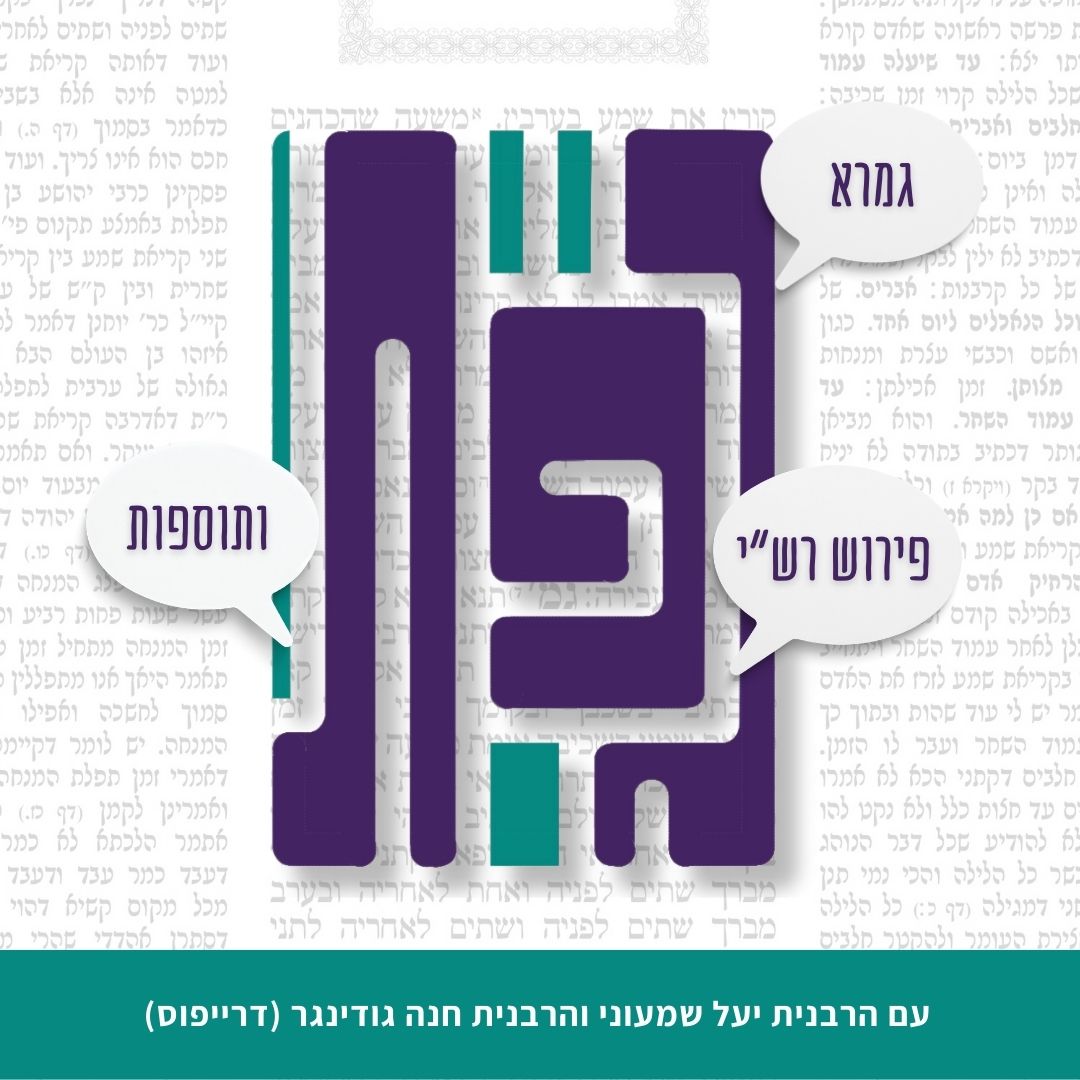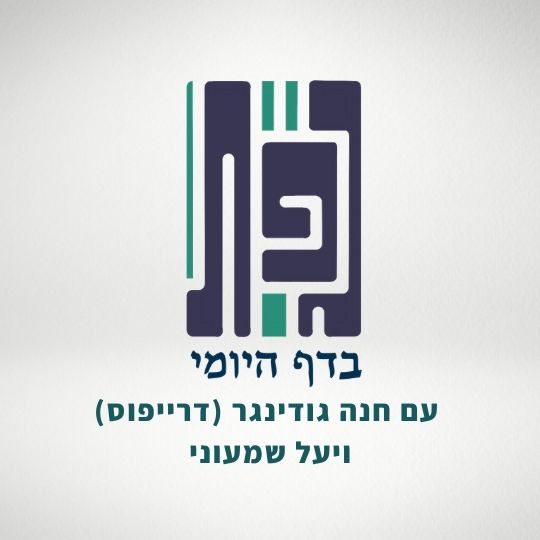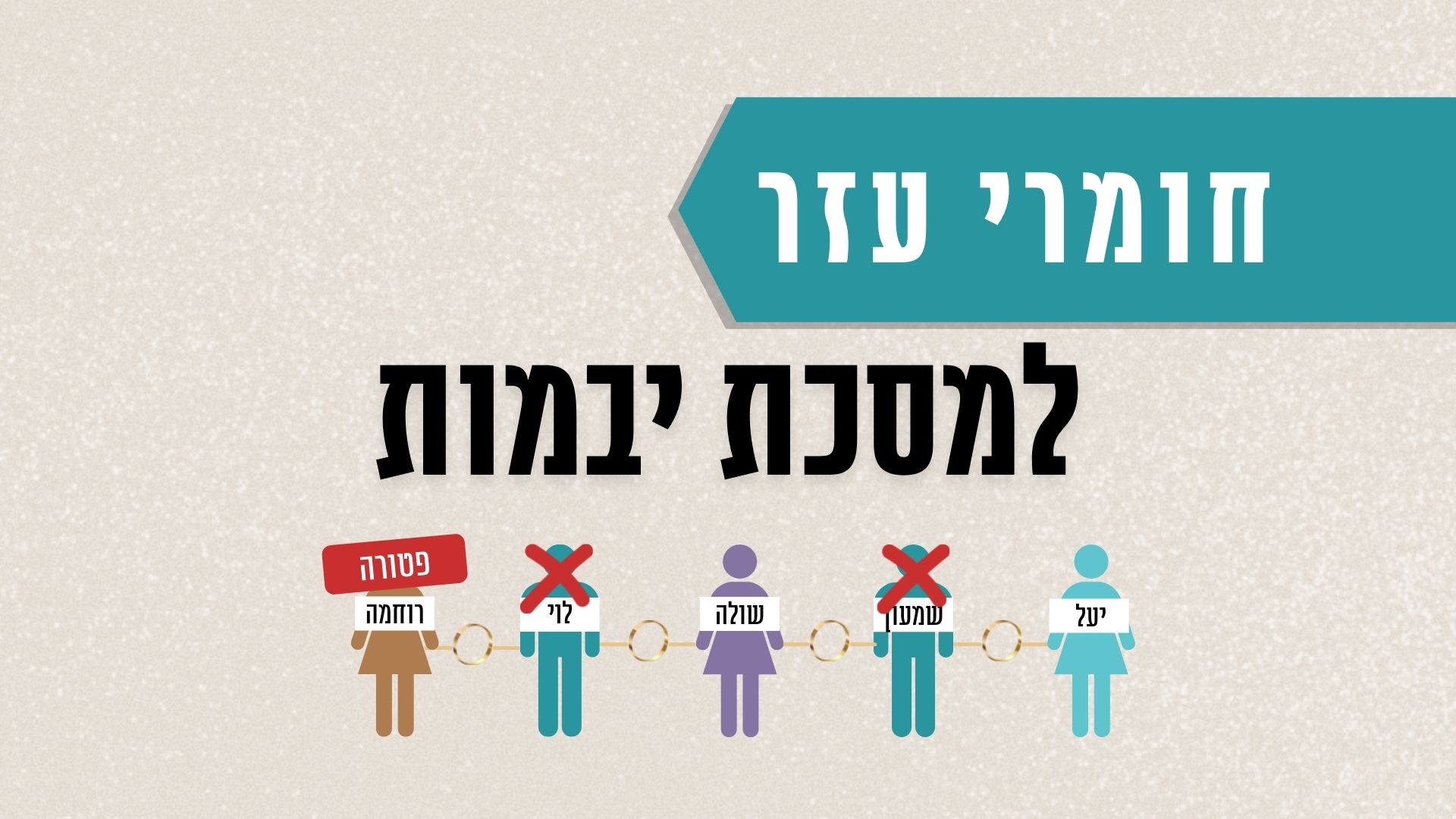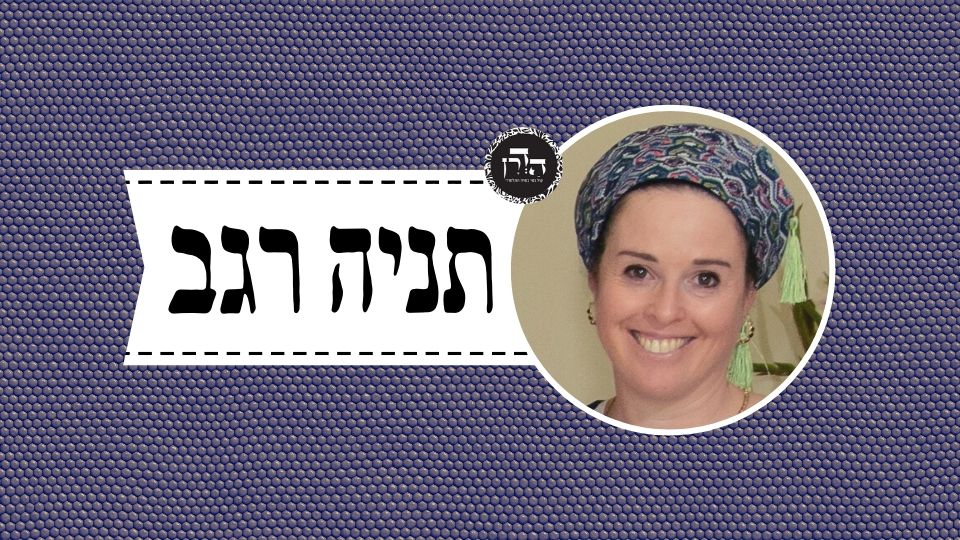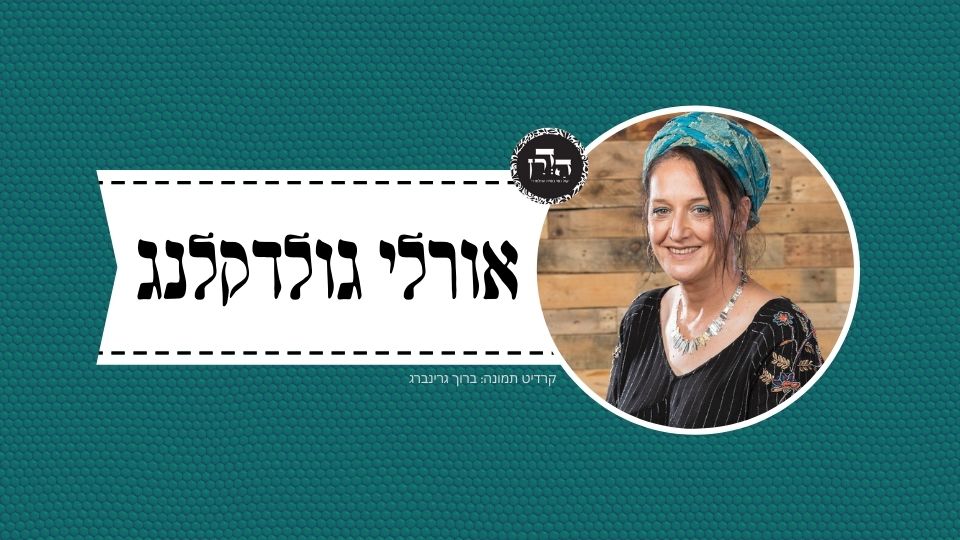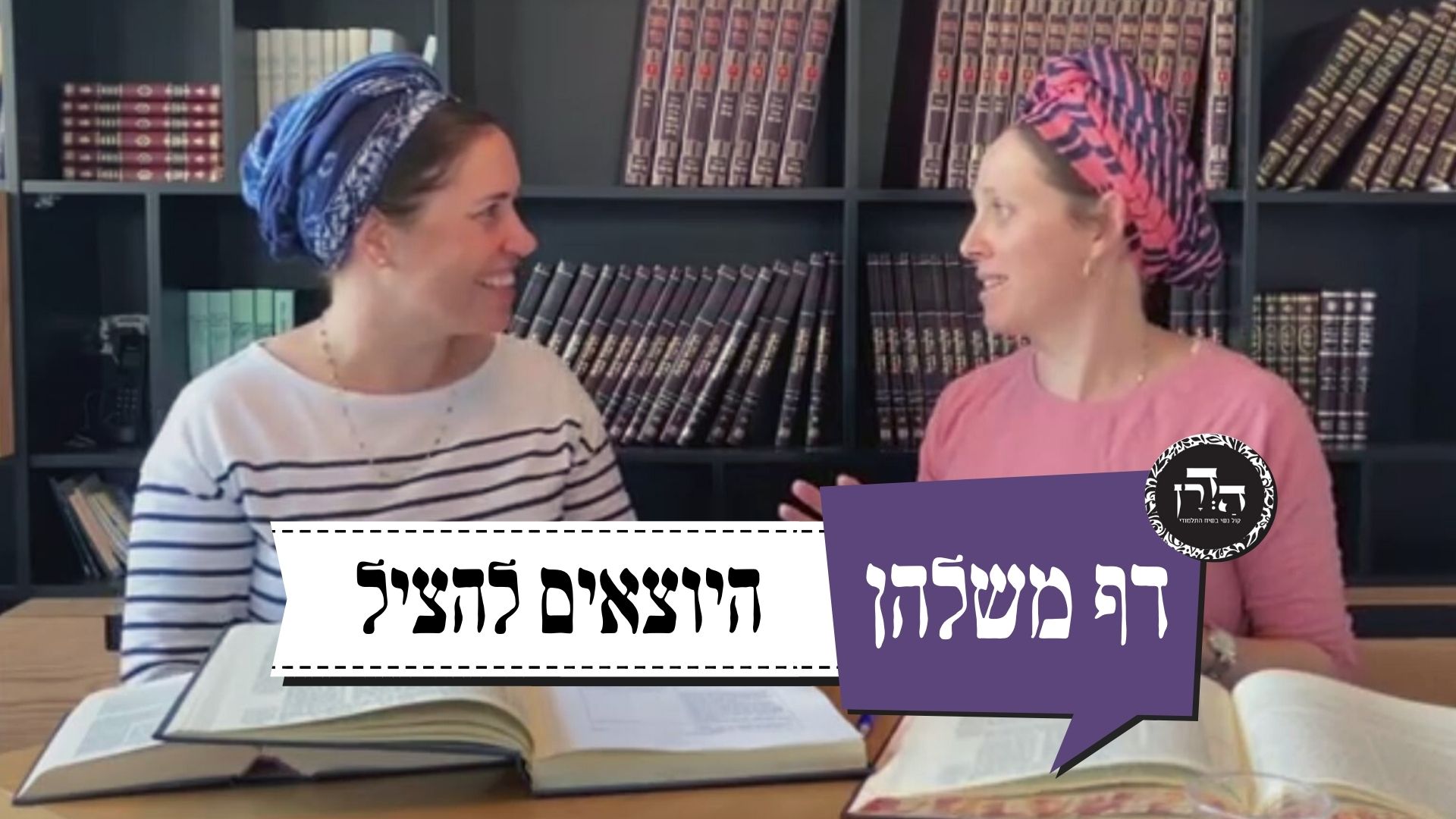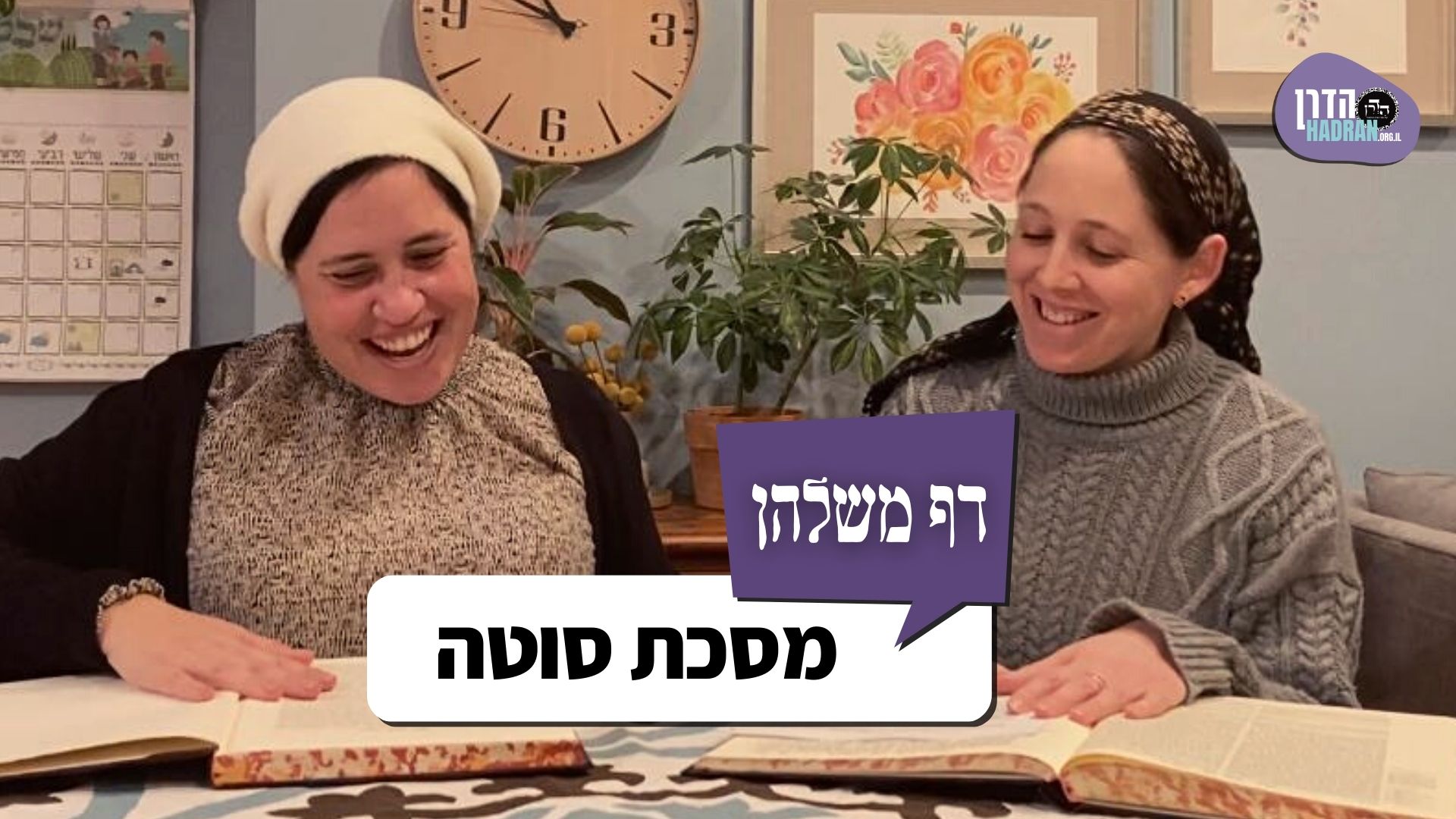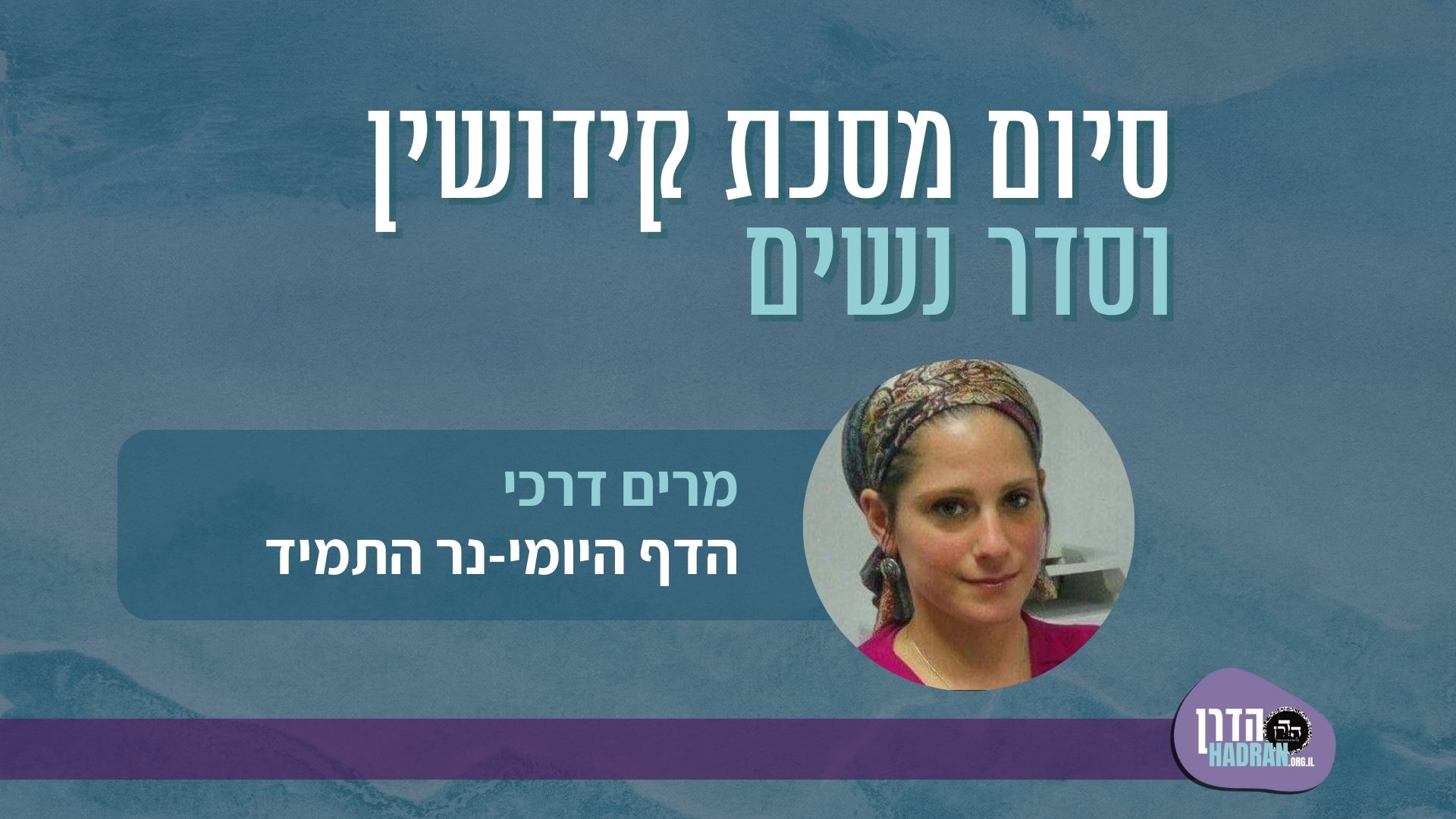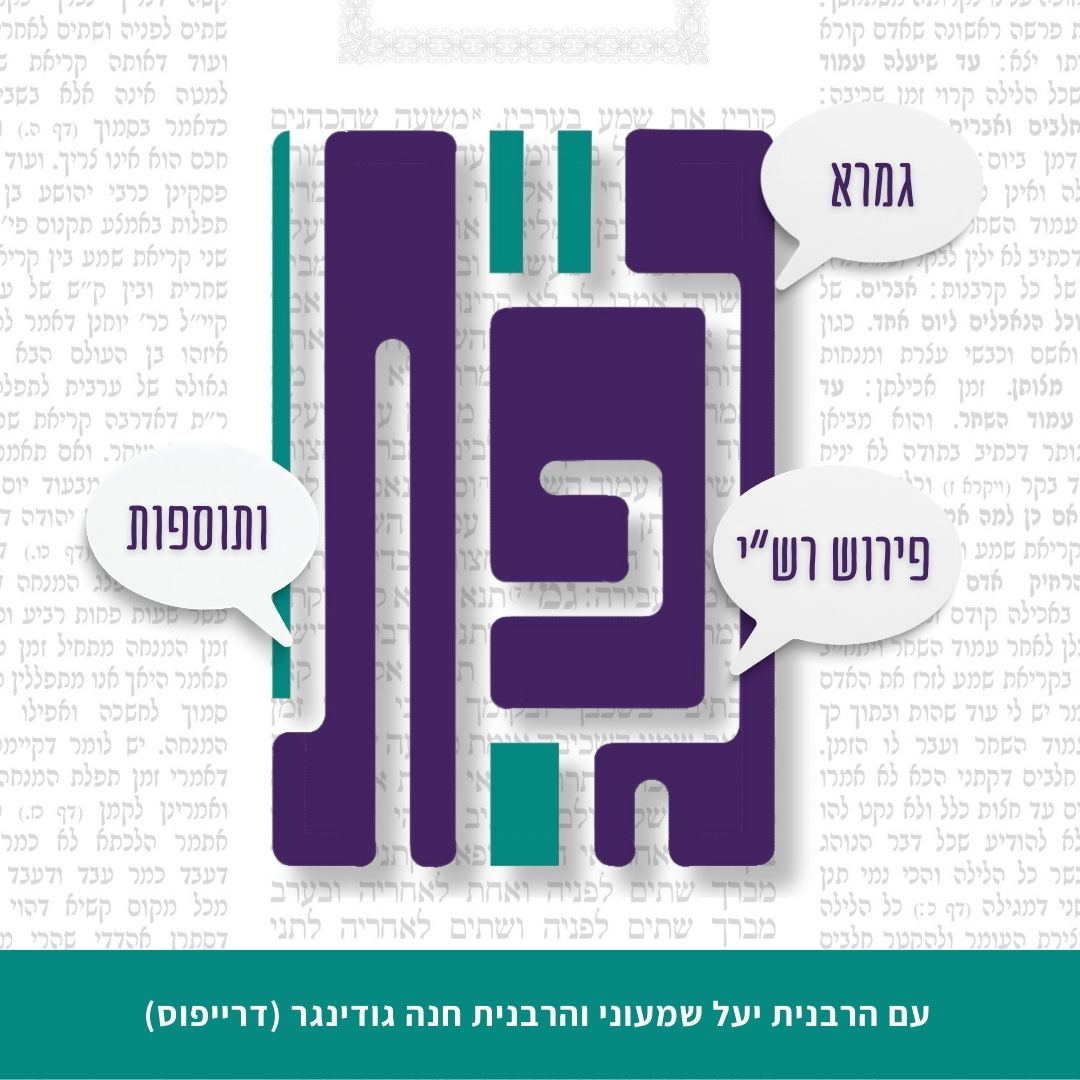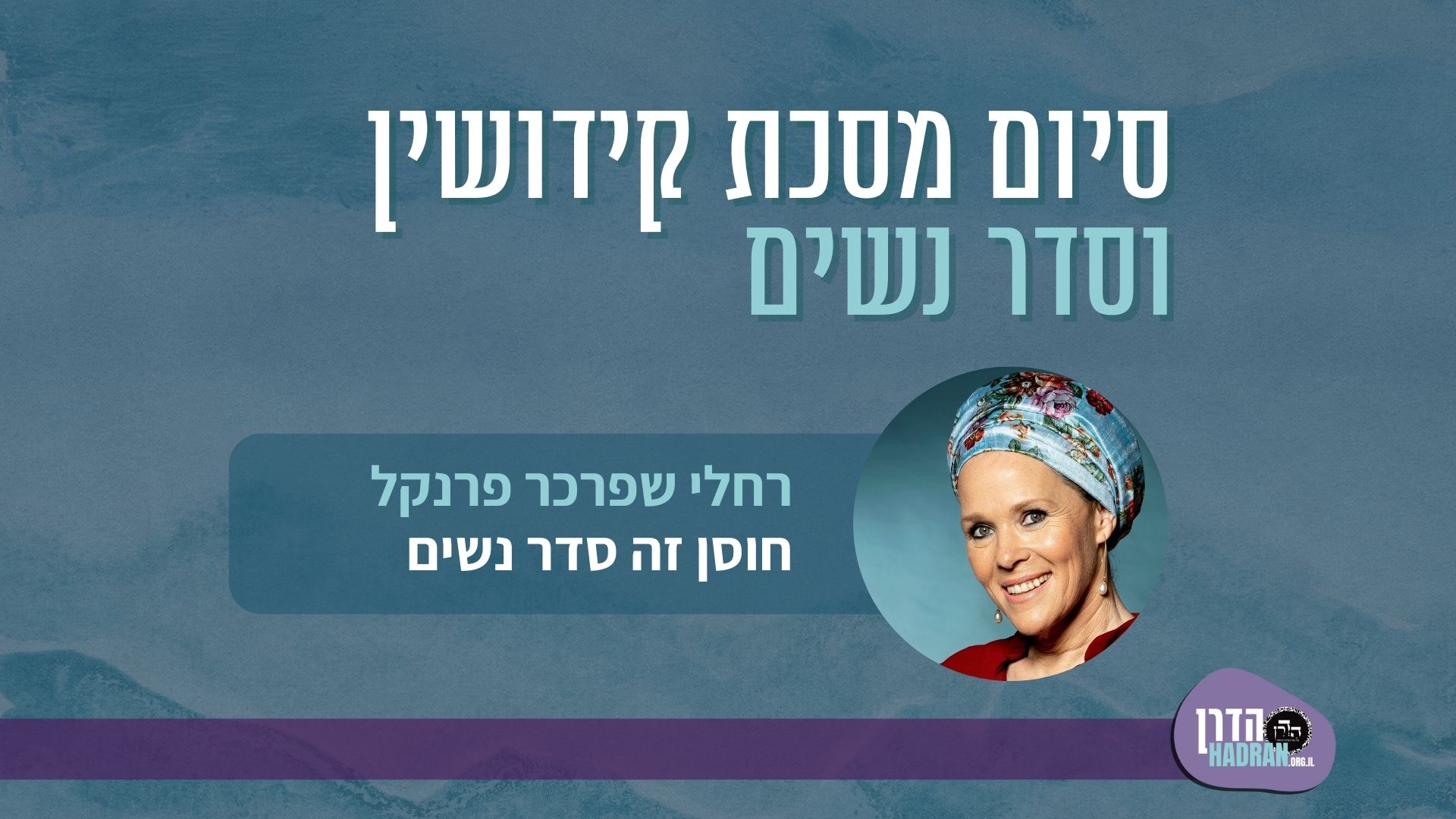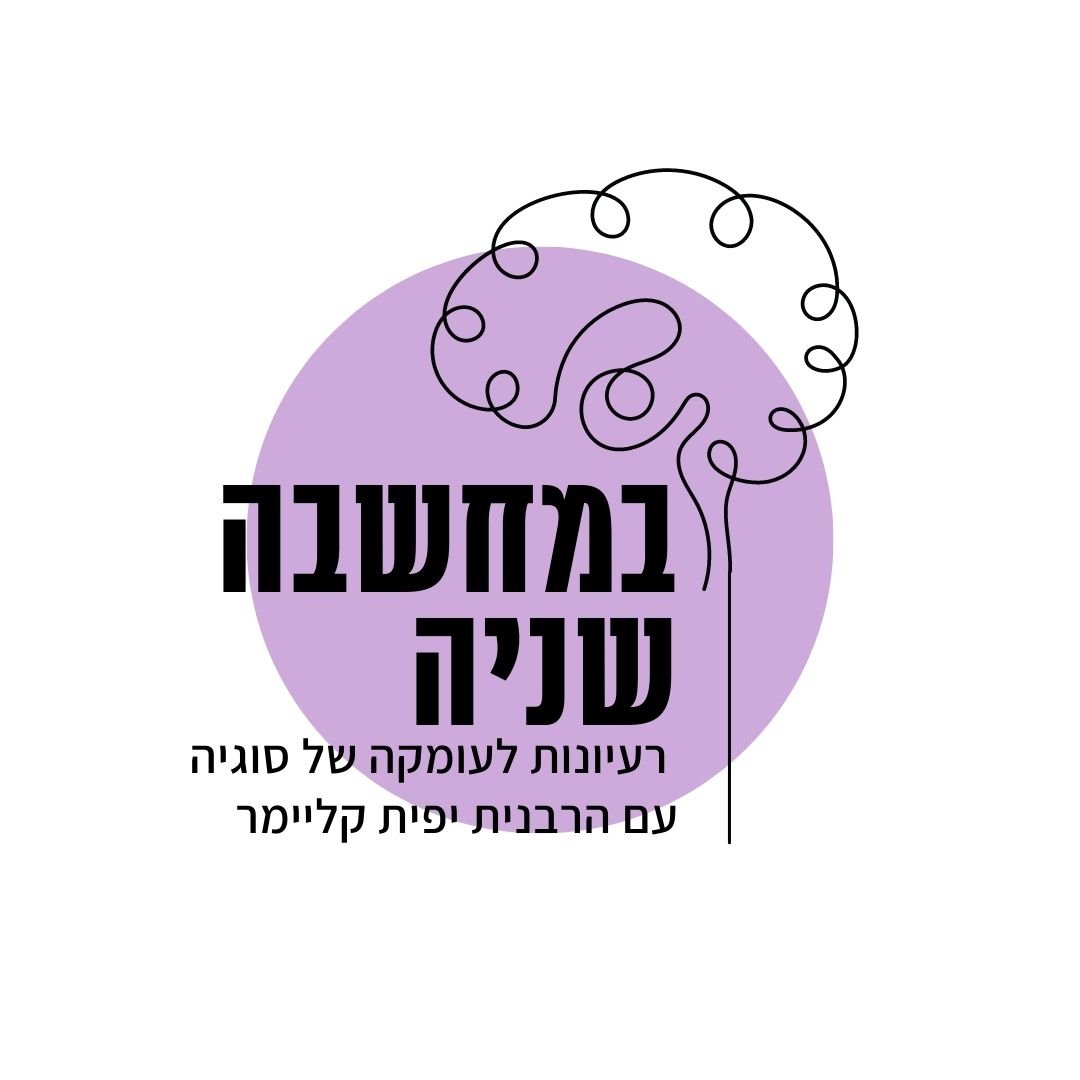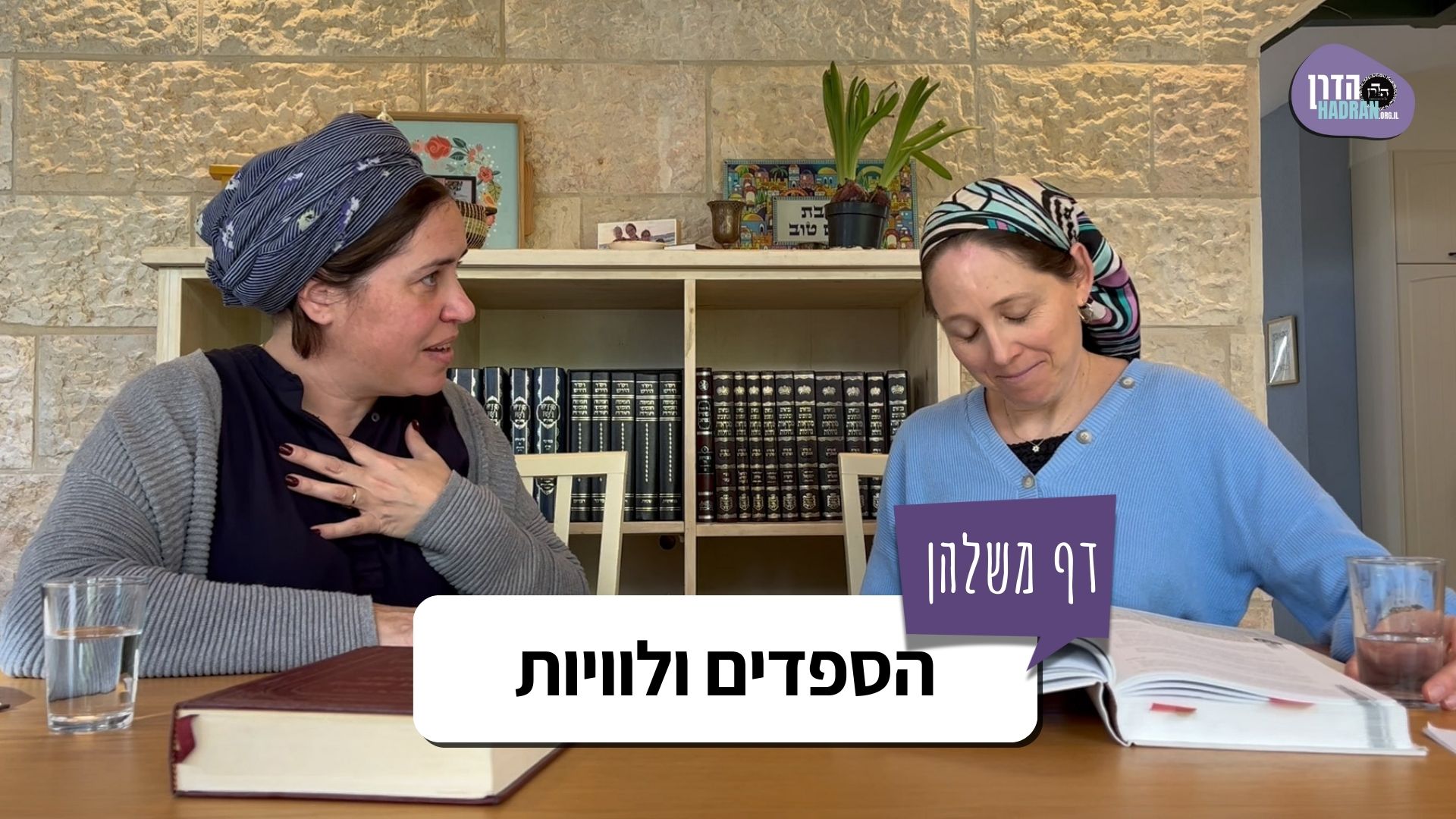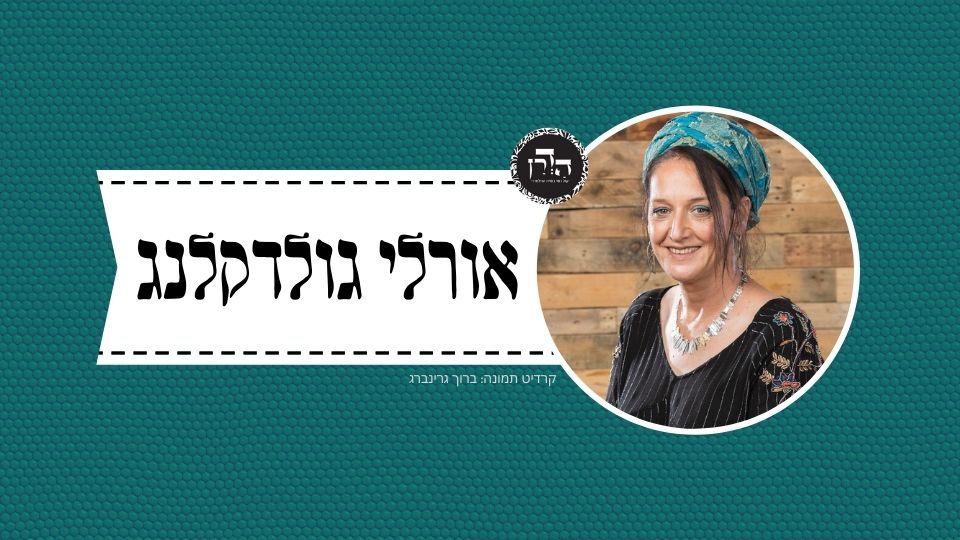איפה ישנו הכהנים? מה קרה אם אירע להם קרי? מתי התעוררו ומה עשו כשהתעוררו? מניין לומדים שהכהנים שמרו את המקדש בשלושה מקומות? איך נראו המקומות שבהם שמרו?
רוצה להקדיש שיעור?
כלים
העמקה
רוצה להבין מה באמת קורה מתחת לפני השטח של הסוגיה?
שיעורים, פודקאסטים והרחבות של מיטב המורות שלנו יפתחו לך עוד זוויות וכיווני חשיבה.
חדשה בלימוד הגמרא?
זה הדף הראשון שלך? איזו התרגשות עצומה! יש לנו בדיוק את התכנים והכלים שיעזרו לך לעשות את הצעדים הראשונים ללמידה בקצב וברמה שלך, כך תוכלי להרגיש בנוח גם בתוך הסוגיות המורכבות ומאתגרות.
פסיפס הלומדות שלנו
גלי את קהילת הלומדות שלנו, מגוון נשים, רקעים וסיפורים. כולן חלק מתנועה ומסע מרגש ועוצמתי.
תמיד כו
בִּמְסִיבָּה הַהוֹלֶכֶת לוֹ תַּחַת הַבִּירָה. וְנֵרוֹת דּוֹלְקִין מִכָּאן וּמִכָּאן. עַד שֶׁהוּא מַגִּיעַ לְבֵית הַטְּבִילָה. וּמְדוּרָה הָיְתָה שָׁם. וּבֵית הַכִּסֵּא שֶׁל כָּבוֹד. זֶה הָיָה כְּבוֹדוֹ: מְצָאוֹ נָעוּל – יוֹדֵעַ שֶׁיֵּשׁ שָׁם אָדָם. פָּתוּחַ – בְּיָדוּעַ שֶׁאֵין שָׁם אָדָם.
through the circuitous passage that extended beneath the Temple, as he could not pass through the Temple courtyard, due to his impurity. And there were lamps burning on this side and on that side of the passage. He would walk through the passage until he reached the Chamber of Immersion. And there was a fire burning there to warm the priests after they had immersed, and also a bathroom of honor, so that the priests could urinate before immersion. This was the manifestation of its honor: If one found the door closed, he would know that there was a person there, and he would wait for him to exit before entering. If one found the door open, it was known that there was no person there, and he could enter. In this manner, the one using it was afforded privacy.
יָרַד, וְטָבַל, עָלָה וְנִסְתַּפֵּג, וְנִתְחַמֵּם כְּנֶגֶד הַמְּדוּרָה. בָּא, וְיָשַׁב לוֹ אֵצֶל אֶחָיו הַכֹּהֲנִים, עַד שֶׁהָיוּ שְׁעָרִים נִפְתָּחִים, יוֹצֵא וְהוֹלֵךְ לוֹ.
After the priest descended and immersed in the ritual bath, he ascended and dried himself with a towel, and warmed himself opposite the fire. He then came back to the Chamber of the Hearth and sat with his brethren the priests until dawn, when the gates of the Temple courtyard would be opened. He would then leave the Temple and go on his way. Since the purification process of one who immerses is not complete until sunset, by rabbinic law he could not remain in the Temple during the daytime.
מִי שֶׁהוּא רוֹצֶה לִתְרוֹם אֶת הַמִּזְבֵּחַ, מַשְׁכִּים וְטוֹבֵל עַד שֶׁלֹּא יָבֹא הַמְמוּנֶּה. וְכִי בְּאֵיזֶה שָׁעָה בָּא הַמְמוּנֶּה? לֹא כׇּל הָעִתִּים שָׁווֹת, פְּעָמִים שֶׁהוּא בָּא מִקְּרוֹת הַגֶּבֶר, אוֹ סָמוּךְ לוֹ מִלְּפָנָיו אוֹ מֵאַחֲרָיו.
The mishna describes the commencement of the daily service in the Temple: Among the members of the priestly family who are to serve in the Temple that day, whoever wants to remove the ashes from the altar rises early and immerses himself in a ritual bath, as required of anyone who enters the Temple courtyard. He must immerse before the appointed priest arrives, as the appointed priest oversees the lottery that determines which priests perform the various rites of the Temple service, and the first of those lotteries determines who will be charged with the removal of the ashes. And at what time does the appointed priest arrive? The times of his arrival are not all the same. There are times that he comes at the call of the rooster [hagever], or he might come at an adjacent time, either before the call of the rooster or after it.
הַמְמוּנֶּה בָּא, וְדָפַק עֲלֵיהֶן, וְהֵן פָּתְחוּ לוֹ, אָמַר לָהֶן: מִי שֶׁטָּבַל – יָבֹא וְיָפִיס, הֵפִיסוּ, מִי שֶׁזָּכָה – זָכָה בּוֹ.
The appointed priest arrived at the Chamber of the Hearth, where the priests of the patrilineal family were assembled, and he knocked on the gate to alert them to open the gate for him. And when they opened the gate for him, he said to them: Whoever immersed in the ritual bath may come and participate in the lottery. They then conducted the lottery, and whoever won that lottery won the privilege to perform the rite of the removal of the ashes.
גְּמָ׳ מְנָא הָנֵי מִילֵּי? אָמַר אַבָּיֵי: אָמַר קְרָא ״וְהַחֹנִים לִפְנֵי הַמִּשְׁכָּן קֵדְמָה לִפְנֵי אֹהֶל מוֹעֵד מִזְרָחָה מֹשֶׁה וְאַהֲרֹן וּבָנָיו שֹׁמְרִים מִשְׁמֶרֶת הַמִּקְדָּשׁ לְמִשְׁמֶרֶת בְּנֵי יִשְׂרָאֵל״.
GEMARA: The mishna teaches that the priests would keep watch in three locations in the Temple. The Gemara asks: From where are these matters derived? Abaye said that they are derived from a verse, as the verse states: “And those that were to camp before the Tabernacle eastward, before the Tent of Meeting toward the sunrise, were Moses and Aaron and his sons, keeping the watch of the Sanctuary, for the watch of the children of Israel, and the non-priest who came near was to be put to death” (Numbers 3:38).
אָמְרִי: אִין, שִׁימּוּר בְּעָלְמָא אַשְׁכְּחַן דְּבָעֵי, כֹּהֲנִים וּלְוִיִּם שִׁימּוּר. מִיהוּ מַתְנִיתִין קָתָנֵי: בִּשְׁלֹשָׁה מְקוֹמוֹת הַכֹּהֲנִים שׁוֹמְרִים בְּבֵית הַמִּקְדָּשׁ, וְהַלְוִיִּם בְּעֶשְׂרִים וְאֶחָד מָקוֹם, וְאִילּוּ קְרָא, כֹּהֲנִים וּלְוִיִּם בַּהֲדֵי הֲדָדֵי כְּתִיב!
The Sages say in response: Yes, we have found in this verse that in general the Torah requires a watch to be kept. Furthermore, the verse indicates that it is the priests and Levites who are required to perform the watch, as it states the precedent of Moses, who was a Levite, and Aaron, who was a priest. But the mishna (Middot 1:1) teaches: The priests would keep watch in three places in the Temple courtyard…and the Levites in twenty-one places. According to the mishna, the priests and Levites kept watch in different locations, whereas in the verse the priests and the Levites are written together, indicating that they kept watch in the same places.
אָמְרִי, הָכִי קָאָמַר: ״וְהַחֹנִים לִפְנֵי הַמִּשְׁכָּן קֵדְמָה לִפְנֵי אֹהֶל מוֹעֵד מִזְרָחָה מֹשֶׁה וַהֲדַר אַהֲרֹן וּבָנָיו שֹׁמְרֵי מִשְׁמֶרֶת הַמִּקְדָּשׁ״. אַהֲרֹן – בְּחַד מָקוֹם, וּבָנָיו – בִּשְׁנֵי מְקוֹמוֹת.
The Sages say that this is what the verse is saying: “And those that were to camp before the Tabernacle eastward, before the Tent of Meeting toward the sunrise, were Moses,” indicating that the Levites keep watch. And then the verse states with regard to the separate watch kept by the priests: “Aaron and his sons, keeping the watch of the Sanctuary.” Furthermore, the verse indicates that Aaron keeps watch in one place, and his sons keep watch in two other places, from which it is derived that the priests keep watch in three different places.
מִמַּאי? מִדִּכְתִיב ״וְהַחֹנִים״, וּכְתִיב ״שֹׁמְרִים״. ״חוֹנִים״ לְחוֹד, וְ״שׁוֹמְרִים״ לְחוֹד.
The Gemara asks: From where is it derived that the verse should be interpreted in this manner? This is derived from the fact that it is written: “And those that were to camp…were Moses,” and it is written separately: “Aaron and his sons, keeping the watch.” This indicates that those who were to camp and thereby keep watch are discrete, and those keeping the watch are discrete, i.e., they perform different watches in separate places.
אֵימָא כּוּלְּהוּ בְּחַד מָקוֹם לְחוֹדֵיהּ! לָא סָלְקָא דַּעְתָּךְ: מָה מֹשֶׁה – בְּחַד מָקוֹם לְחוֹדֵיהּ, אַף אַהֲרֹן וּבָנָיו – בְּחַד מָקוֹם לְחוֹדֵיהּ.
The Gemara objects: One can say that all of the priests keep watch in one place that is discrete from the watches of the Levites, but not in three separate places. The Gemara explains: That possibility should not enter your mind, as the verse juxtaposes the watches of Moses and Aaron. This indicates that just as Moses keeps watch in one place discretely, so too, Aaron and his sons each keep watch in one place discretely, and they do not keep watch together.
רַב אָשֵׁי אָמַר, מִסֵּיפֵיהּ דִּקְרָא: ״שֹׁמְרִים מִשְׁמֶרֶת … לְמִשְׁמֶרֶת״.
Rav Ashi said that the halakha that the priests keep watch in three places is derived from the end of the verse, which states: “Moses and Aaron and his sons, keeping [shomerim] the watch [mishmeret] of the Sanctuary, for the watch [lemishmeret] of the children of Israel.” The verse uses three terms from the root shin, mem, reish, which means to watch, indicating that there should be three separate watches.
בֵּית אַבְטִינָס וּבֵית הַנִּיצוֹץ. אִיבַּעְיָא לְהוּ: עֲלִיּוֹת מַמָּשׁ הֲווֹ, אוֹ דִלְמָא דַּהֲווֹ גְּבִיהִי מִגְבָּהּ כַּעֲלִיּוֹת?
§ The mishna teaches that the Chamber of Avtinas and the Chamber of the Spark were upper stories. Concerning this, a dilemma was raised before the Sages: Were these halls actual upper stories? Or perhaps they were merely very tall, built upon pillars, and therefore were like upper stories.
תָּא שְׁמַע, דִּתְנַן: שֶׁבַּצָּפוֹן שַׁעַר הַנִּיצוֹץ כְּמִין אַכְסַדְרָא הָיָה, וַעֲלִיָּיה בְּנוּיָה עַל גַּבָּהּ, שֶׁהַכֹּהֲנִים שׁוֹמְרִים מִלְמַעְלָה, וְהַלְוִיִּם מִלְּמַטָּה. וּפֶתַח הָיָה לוֹ לַחוֹל.
The Gemara explains: Come and hear a resolution, as we learned in a mishna that discusses the seven gates to the Temple courtyard (Middot 1:5): There were three gates that were in the north, and the first of these was the Gate of the Spark. It was like a portico [akhsadra], and there was an upper story built atop it, where the honor guard stood, with the priests watching from above, in the upper story; and the Levites would keep watch from below. And the hall had an entrance toward the non-sacred area of the Temple Mount. This mishna indicates that the Chamber of the Spark was an actual upper story.
מְנָא הָנֵי מִילֵּי? דְּתָנוּ רַבָּנַן: ״וְיִלָּווּ עָלֶיךָ וִישָׁרְתוּךָ״ – בַּעֲבוֹדָתְךָ הַכָּתוּב מְדַבֵּר.
The Gemara asks: From where are these matters, that the priests and Levites kept watch on different stories, derived? This is derived from a verse, as the Sages taught in a baraita: The verse states that God said to Aaron: “And your brethren also, the tribe of Levi, the tribe of your father, you shall bring near with you, that they may accompany you and serve you” (Numbers 18:2). The verse is speaking of the Levites accompanying Aaron in your, i.e., Aaron’s, service of keeping watch in the Temple, which is the only service performed by both priests and Levites. Since the verse speaks of the watch of the Levites only as an accompaniment to the watch of the priests, the Levites do not keep watch from above like the priests, but only from below.
אַתָּה אוֹמֵר בַּעֲבוֹדָתְךָ הַכָּתוּב מְדַבֵּר, אוֹ אֵינוֹ אֶלָּא בַּעֲבוֹדָתָם! כְּשֶׁהוּא אוֹמֵר ״וְנִלְווּ עָלֶיךָ וְשָׁמְרוּ לְכׇל כֵּלָיו וּלְכֹל עֲבֹדָתוֹ״ – הֲרֵי בַּעֲבוֹדָתָם אָמוּר. הָא מָה אֲנִי מְקַיֵּים ״וְיִלָּווּ עָלֶיךָ וִישָׁרְתוּךָ״ – בַּעֲבוֹדָתְךָ הַכָּתוּב מְדַבֵּר. הָא כֵּיצַד? כֹּהֲנִים שׁוֹמְרִים מִלְמַעְלָה, וּלְוִיִּם מִלְּמַטָּה.
The baraita asks: Do you say that the verse speaks of the Levites’ accompanying the priests in your service, of the priests keeping watch, or is it only stating that the Levites should accompany the priests through their own service of bearing the sacred vessels? The baraita explains that when the verse states: “And they shall accompany you, and they shall keep the watch of the Tent of Meeting” (Numbers 18:4), this is referring to keeping watch of all the Temple’s vessels and all its service, and consequently their own service of bearing the sacred vessels is already stated. How, then, do I realize the meaning of the previous verse: “That they may accompany you and serve you” (Numbers 18:2)? The verse is speaking of the Levites accompanying the priests in your service, of the priests keeping watch in the Temple. How so? The priests keep watch from above, and the Levites accompany them from below.
בֵּית הַמּוֹקֵד כִּיפָּה, וּבַיִת גָּדוֹל הָיָה.
§ With regard to the third place in which the priests would keep watch, the mishna states: In the Chamber of the Hearth the ceiling was round like a cupola, and it was a large hall.
וְחַד שׁוֹמֵר הוּא דַּהֲוָה בְּבֵית הַמּוֹקֵד? וּרְמִינְהִי: שְׁנֵי שְׁעָרִים הָיוּ בְּבֵית הַמּוֹקֵד, אֶחָד פָּתוּחַ לַחֵיל, וְאֶחָד פָּתוּחַ לָעֲזָרָה. אָמַר רַבִּי יְהוּדָה: בָּזֶה שֶׁנִּכְנָסִין לָעֲזָרָה – פִּשְׁפָּשׁ קָטָן הָיָה לוֹ, שֶׁבּוֹ נִכְנָסִין לִבְלוֹשׁ הָעֲזָרָה! אָמַר אַבָּיֵי: כֵּיוָן דְּגַבֵּי הֲדָדֵי הֲווֹ קָיְימִי – סַגִּי לְהוּ בְּחַד שׁוֹמֵר, דָּוֵי לְהָכָא וְדָוֵי לְהָכָא.
The Gemara asks: But was there only one watchman in the Chamber of the Hearth? And the Gemara raises a contradiction from a mishna (Middot 1:7): The Chamber of the Hearth had two gates; one, on the north side, was open to the rampart, and one, on the south side, was open to the courtyard. Rabbi Yehuda said: This gate that was open to the courtyard had a small wicket in the door of the gate, through which the priests would enter in order to examine the courtyard and ensure that everything was in order. The Chamber of the Hearth had two gates, and therefore there should have been two watchmen there. Abaye said: Since the two gates stood next to each other, i.e., directly opposite one another, it was sufficient for them to be watched by one watchman, who could look here and look there.
מוּקָּף רוֹבְדִין שֶׁל אֶבֶן. רוֹבְדִין מַאי נִיהוּ? גִּזְרָתָא דְאִצְטְבָתָא דְּסָלְקִי בְּהוּ לְאִצְטְבָתָא. וּמִי הֲווֹ מִיפַּלְגִי אֲבָנִים? וְהָכְתִיב: ״וְהַבַּיִת בְּהִבָּנוֹתוֹ אֶבֶן שְׁלֵמָה וְגוֹ׳״!
§ The mishna teaches that the Chamber of the Hearth was surrounded by rows of stone that protruded from the walls and that served as benches. The Gemara asks: What are these rows of stone? They are rows of chiseled stones by which the priests ascend to another row of stone, where they could lie down. The Gemara asks: And would they split the stones in the process of building the Temple? But isn’t it written: “For the Temple, when it was being built, was built of whole stone made ready at the quarry; and there was neither hammer nor ax nor any tool of iron heard in the Temple, while it was being built” (I Kings 6:7)?
אָמַר אַבָּיֵי: דִּמְתַקְּנִי וּמַיְיתִי מֵעִיקָּרָא אַבְנֵי זוּטְרָתָא וְאַבְנֵי רַבְרְבָתָא, כְּדִכְתִיב: ״אַבְנֵי עֶשֶׂר אַמּוֹת וְאַבְנֵי שְׁמֹנֶה אַמּוֹת״.
Abaye said: It was prohibited to use iron implements to cut the stones only inside the Temple area. In this case it was permitted to have chiseled stones, as the builders prepared the stones in another location. And the builders initially brought small stones and large stones with which to build the Temple, as it is written: “And the foundation was of costly stones, even great stones, stones of ten cubits, and stones of eight cubits” (I Kings 7:10). Accordingly, the larger stones were used for the lower tier, while the smaller stones were for the higher tier, forming protruding benches upon which the priests could sleep.
זִקְנֵי בֵּית אָב יְשֵׁנִים שָׁם. וְאַמַּאי? לְעַיְּילִי מִטּוֹת! אָמַר אַבָּיֵי: לָאו אוֹרַח אַרְעָא לְעַיּוֹלֵי מִטּוֹת לְבֵית הַמִּקְדָּשׁ.
The mishna teaches that the elders of the patrilineal family that would serve in the Temple the following day would sleep there, on the rows of stone. The Gemara asks: But why did the priests sleep on the stones? Let them bring beds into the Chamber of the Hearth. Abaye said: It is not proper conduct to bring beds into the Temple.
פִּרְחֵי כְהוּנָּה, אִישׁ כְּסוּתוֹ בָּאָרֶץ. אַמַּאי הָתָם קָרֵי לְהוּ ״רוֹבִים״, הָכָא קָרֵי לְהוּ
The mishna further teaches that with regard to the young men of the priesthood, each of them would sleep with his garment on the ground. The Gemara asks: Why is it that there, in the earlier mishna, the tanna calls them young [rovim] priests, whereas here, the tanna calls them



